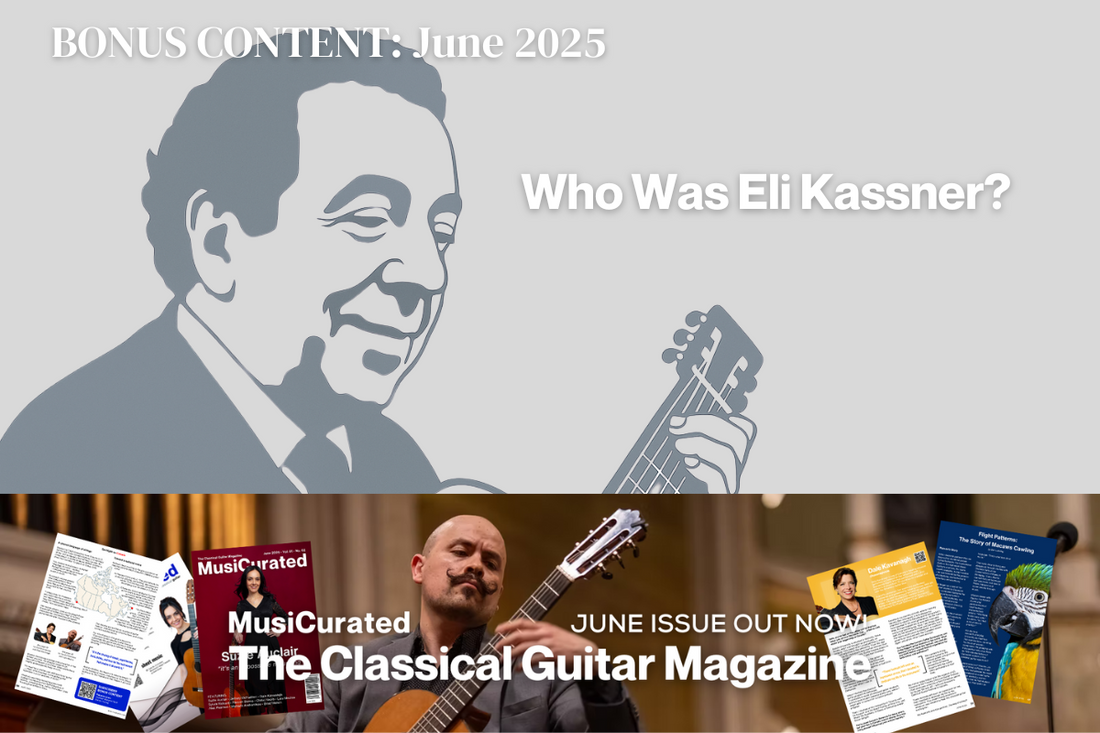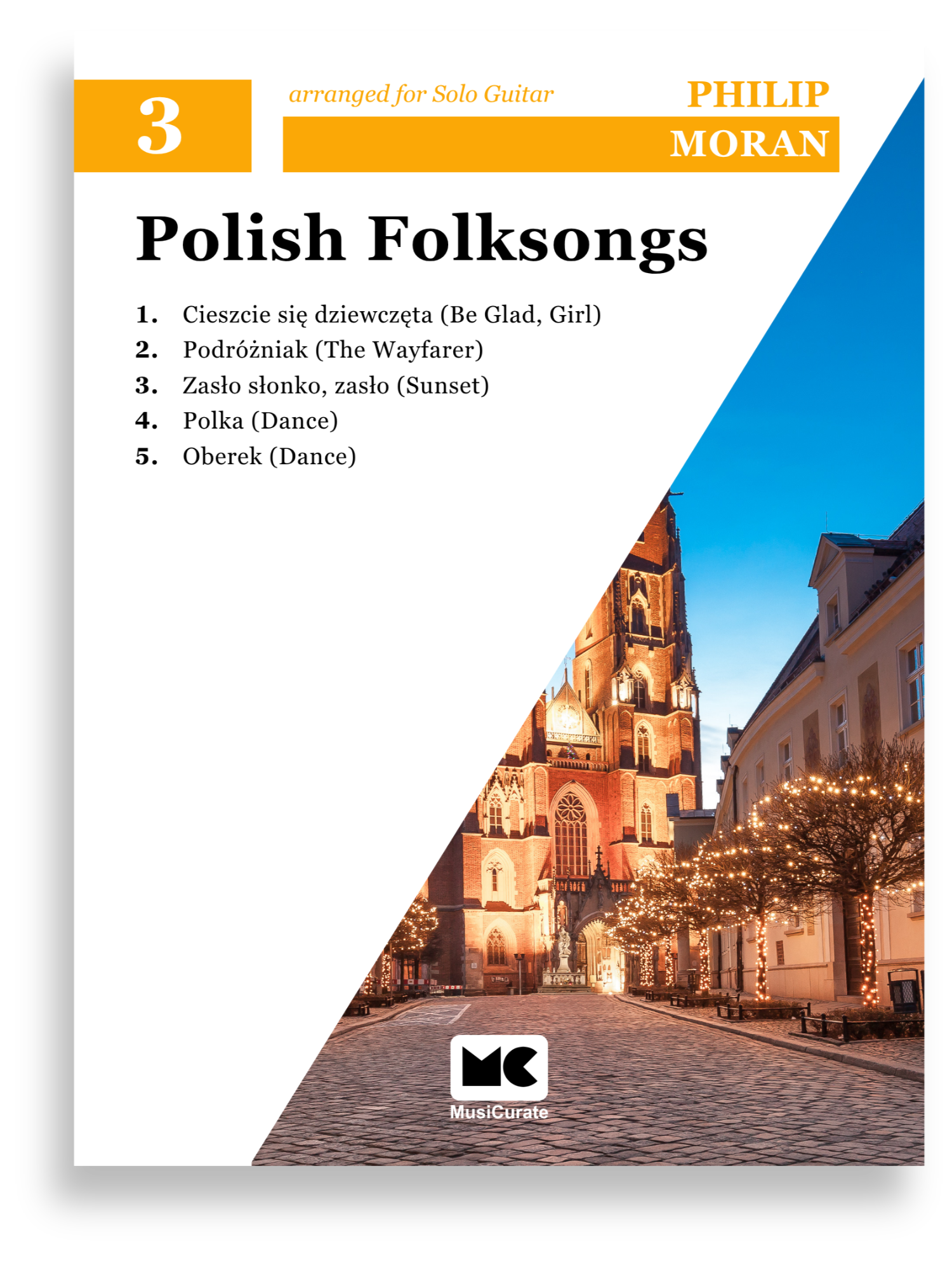
Who Was Eli Kassner?
Share
When we speak of the classical guitar’s place in Canadian culture today, with its robust academic programs, international festivals, and accomplished performers, much of that legacy leads back to one man: Eli Kassner. A teacher, visionary, and tireless advocate, Kassner did not merely shape the course of Canadian guitar history; he laid its very foundation.
Born in Vienna in 1924, Kassner began playing guitar at the age of eight. His early life was marked by turmoil. He and his brother were the only members of their family to escape the Holocaust. In 1939, he left Austria on one of the final pre-war transports and eventually arrived in Israel. There, he served in the army and worked in youth education. After the war, in 1951, Kassner’s brother invited him to Canada. He arrived in Toronto with little money, limited English, and a guitar.
In Toronto, Kassner began to carve out a place for himself in the music world. He first worked at a music store, where he would practice guitar quietly in his spare moments. By 1953, he was teaching regularly. Just three years later, he founded the Guitar Society of Toronto. With bold conviction, he invited Andrés Segovia, the world’s most celebrated classical guitarist at the time, to serve as the society’s honorary president. To his delight, Segovia accepted.
In 1959, Kassner became the first person in Canada to be appointed to teach guitar at a university-level music department, joining the faculty at the University of Toronto. That same year, he helped establish the guitar program at The Royal Conservatory of Music. A Canada Council grant made it possible for him to travel to Spain to study directly with Segovia, further cementing his place in the lineage of classical guitar excellence.
Kassner’s contributions went beyond teaching. In 1967, he opened the Eli Kassner Guitar Academy, which became a cornerstone of guitar instruction in Canada. He performed professionally until that same year. In the 1970s, his interests expanded into microphotography, and he worked as a composer and performer for CBC Television series including The Lively Arts and The Nature of Things.
One of his most ambitious undertakings was the launch of international guitar festivals in Toronto, beginning with "Guitar ’75." These events, organized alongside his beloved wife Ann, brought some of the finest guitarists and composers in the world to Canada. The festivals established Toronto as a global centre for classical guitar and inspired similar events around the world.
Kassner’s home at 9 Gibson Avenue became a hub for artists passing through Toronto. Renowned for their hospitality, Eli and Ann were legendary hosts, known for their lively gatherings filled with conversation, music, and good food. Virtually every major guitarist who visited Toronto during those decades shared in their warmth.
His legacy as a teacher is profound. He mentored several generations of performers, including international names such as Liona Boyd, Jesse Cook, and Norbert Kraft. He inspired composers to write for the guitar, helping to expand the instrument’s contemporary repertoire.
In recognition of his contributions, Kassner received numerous honors. He was awarded an honorary Doctor of Music from Carleton University, was inducted into the Guitar Foundation of America’s Hall of Fame in 2011, and in 2016 was appointed a Member of the Order of Canada. He also received the Queen’s Jubilee Silver Medal and the lifetime title of Artistic Director Emeritus from the Guitar Society of Toronto.
Eli Kassner passed away on August 24, 2018, at the age of 94. His extraordinary life is chronicled in his autobiography Allegro Vivace Con Brio. More than a musician, Kassner was a cultural architect. He transformed the classical guitar in Canada from a curiosity into a respected concert and academic discipline.
The music scene in Canada, and the lives of countless musicians and audiences, are richer because of Eli Kassner. His influence continues to resonate through the strings of every guitarist who studies, teaches, or performs in the country he helped to shape.
MORE:
Guitar Society of Toronto. (2018). In memoriam: Eli Kassner (1924–2018). https://guitarsocietyoftoronto.com/in-memoriam-eli-kassner-1924-2018/
University of Toronto Faculty of Music. (1989, May 27). Eli Kassner 65th birthday tribute program. https://faculty100.music.utoronto.ca/wp-content/uploads/2018/08/Eli-Kassner-65th-Birthday-Tribute-Program-27-May-1989.pdf
Engelmann, F. C., Prokop, M., & Szabo, F. A. J. (Eds.). (1996). A history of the Austrian migration to Canada: Selected essays. McGill-Queen’s University Press. https://dokumen.pub/a-history-of-the-austrian-migration-to-canada-selected-essays-9780773598133-t-6961560.html
Carleton University. (n.d.). Eli Kassner. https://carleton.ca/senate/honorary-degree-guidelines-and-nominations/eli-kassner/
Classical Guitar Magazine. (2018, August 24). RIP Eli Kassner: Legendary figure elevated classical guitar in Canada and the world. https://classicalguitarmagazine.com/rip-eli-kassner-legendary-figure-elevated-classical-guitar-in-canada-and-the-world/
Guitar Foundation of America. (n.d.). Eli Kassner: Hall of Fame. https://www.guitarfoundation.org/page/HoFKassner
(2013). Eli Kassner. In The Canadian Encyclopedia. Retrieved from https://www.thecanadianencyclopedia.ca/en/article/eli-kassner-emc

